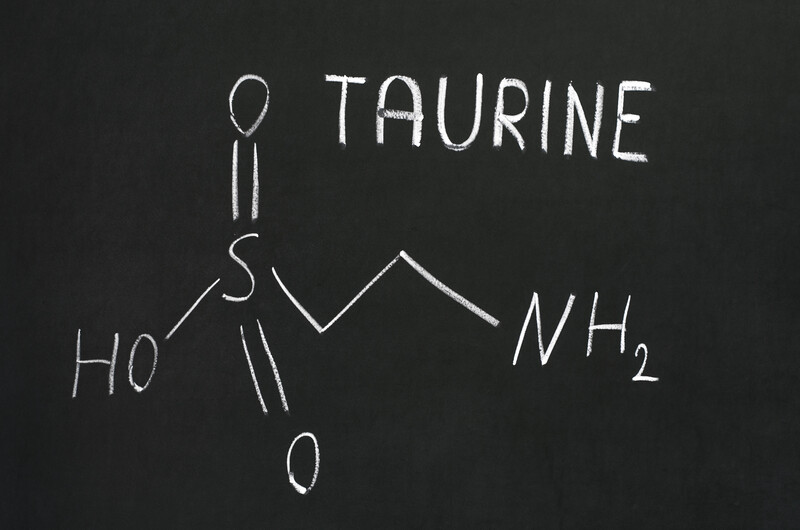(Article Medically Reviewed By Dr. Zach Hyde)
The Gonad Friendly Amino Acid for Men
For a few decades now, energy drinks have been slowly infiltrating a world previously dominated by coffee, espresso and tea.
One of the most popular ingredients in modern energy drinks (and the namesake for the best-selling product of the lot) is taurine.
But what exactly is taurine?
Moreover, does it have any effects outside of providing a boost of energy?
In this article, we’ll grab the bull by the horns and find out.

Taurine and Hormones
Taurine is an organic amino acid.
However, where some of these acids are essential (lysine, tryptophan, valine), it is merely semi-essential, meaning that it can be both produced and synthesized by the human body.
What’s really interesting is that taurine is actually the most common amino acid found in two places:
- Female Breast Milk
- Male testicles
Now, these two sources are about as far away from each other (both in location and function) as you could possibly imagine.
However, this does hint that taurine does have some sort of hormonal interaction, which may or may not yet be totally understood.
For instance, the fact that breast milk contains high levels of taurine supports the idea that it is far more crucial to human body development than previously thought.
Indeed, “mother’s breast milk” is, by design, a “superfood,” containing everything a baby might need to grow up healthy and strong.
Unfortunately, this poses more questions than it does answers.
Still, it’s a curious idea that, as you’ll see in the next section, a variety of researchers have decided to explore.
Taurine and Testosterone Levels
Whenever we discuss taurine, there’s a bit of myth-building that we need to cut through in order to get to the real meat of the conversation.
For instance, the substance gets its name because it was originally “discovered” in bull testicles back in the early 1800s.
Because bulls have long been considered the leading sexual studs of the animal world, this immediately led to an assumption that taking taurine must make your manly bits all the more manly.
But let’s not get ahead of ourselves. After all, science has come a long way since 1800, right?
Below, we’ll outline a number of studies that have attempted to confirm or deny what many proponents of taking taurine claim: that it’s a potent natural testosterone booster.
Taurine And Blood Flow
One of the established facts about taurine is that it makes up roughly 50% of all amino acids present in cardiac tissue.
When ingested, studies show that it can significantly contribute to arterial relaxation and blood flow.
This isn’t related to testosterone, of course, but anyone who’s paid attention to the articles on this site is well aware of the importance blood flow plays in the angle of your dangle.
That is: if you want better erections, getting those arteries pumping to your extremities is priority number one.
Taurine is one of the most important amino acids for the overall functioning of our central nervous system.
This means it affects our eyesight, calcium signaling, and the development of muscle tissue.
Moreover, it can reduce oxidative stress in tissues all over the body, reversing damage caused by free radicals and keeping all parts of your body (including your penis and testicles) healthy.
So those are some of the ways that taurine COULD contribute to male sexual health.
Now, let’s look at testosterone-based studies specifically.
Taurine and Testosterone Studies
According to a handful of studies, taurine protects testosterone molecules from oxidative damage that might take place inside the sex glands themselves.
This itself is impressive enough to consider taurine a highly desirable supplement.
That is, if it doesn’t increase testosterone levels per se, it could increase the levels leftover by reducing the number of molecules claimed by oxidative damage.
Diabetes and low testosterone levels have a long-established link, with one inevitably resulting in the other somewhere down the line.
Indeed, men with low T are at a disproportionate risk of developing diabetes, as the hormone helps the body’s tissues take in more blood sugar.
However, once diabetes is in full swing, it pillages the remaining testosterone at an alarming rate.
Fortunately, taurine has been shown in various studies to protect testosterone molecules from this unfortunate harvest.
A Chinese study from 2010 found that taurine increased superoxide mutase and glutathione levels in the testicles.
These are both known to be super powerful antioxidants, which again supports the theory that taurine may “shield” testosterone molecules and the tissues that produce them from damage.
Those results are made even more impressive by the fact that an increase in blood flow and nitric oxide (which helps trigger the erection response) were also observed.
Moreover, wherever you have more blood flow to the testosterone-producing tissues, you inevitably get more T as well!
One study on pregnant rats found that even a small addition of taurine (1%) to the mother rat’s diet resulted in offspring with significantly higher testosterone levels when compared to placebo rats.
When applied to rats of all ages, a 1% taurine diet resulted in increases in serum testosterone of up to 180%.
Another study later found that this effect was also coupled with significant boosts in luteinizing and follicle-stimulating hormone levels.
An in-vitro study performed in 2010 looked attempted to examine the actual mechanism behind taurine’s hormone-boosting abilities.
While not settled science by any means, it was discovered that the amino acid actually stimulates the human chorionic gonadotrophin, or hCG.
This would be more than adequate to induce additional testosterone production and (if proven by additional research) would more than account for the results of the above tests.
Taurine and Testosterone Conclusion
Obviously, taurine has some extremely intriguing benefits here.
Unfortunately, a lack of human trials (particularly on adults), is keeping some doubts in the mix regarding taurine’s actual benefits.
While we do share remarkably similar reproductive and endocrine systems with rats, animal models are just not good enough for taurine to earn the scientific community’s “seal of approval.”
From an anecdotal standpoint, most men have reported very positive effects after taking regular doses of taurine.
At the very least, the fact that it can protect testosterone molecules from oxidative damage makes it a noteworthy supplement for maximizing male sexual health.
Will supplementation shoot your T levels into the stratosphere? Probably not.
However, if it protects the testosterone molecules you already have, that’s a pretty big benefit in my book.


